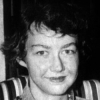Flannery O'Connor

Flannery O'Connor
Mary Flannery O'Connorwas an American writer and essayist. An important voice in American literature, she wrote two novels and 32 short stories, as well as a number of reviews and commentaries. She was a Southern writer who often wrote in a Southern Gothic style and relied heavily on regional settings and grotesque characters. Her writing also reflected her own Roman Catholic faith and frequently examined questions of morality and ethics. Her posthumously-compiled Complete Stories won the 1972 U.S. National Book...
NationalityAmerican
ProfessionNovelist
Date of Birth25 March 1925
CitySavannah, GA
CountryUnited States of America
The Bible was the only book he read. He didn't read it often but when he did he wore his mother's glasses. They tired his eyes so that after a short time he was always obliged to stop.
One old lady who wants her head lifted wouldn't be so bad, but you multiply her two hundred and fifty thousand times and what you get is a book club.
There was a time when the average reader read a novel simply for the moral he could get out of it, and however na?ve that may have been, it was a good deal less na?ve than some of the limited objectives he has now. Today novels are considered to be entirely concerned with the social or economic or psychological forces that they will by necessity exhibit, or with those details of daily life that are for the good novelist only means to some deeper end.
Your criticism sounds to me as if you have read too many critical books and are too smart in an artificial, destructive, and very limited way.
When a book leaves your hands, it belongs to God. He may use it to save a few souls or to try a few others, but I think that for the writer to worry is to take over God's business.
I am not afraid that the book will be controversial, I'm afraid it will not be controversial.
Harcourt sent my book to Evelyn Waugh and his comment was: “If this is really the unaided work of a young lady, it is a remarkable product.” My mother was vastly insulted. She put the emphasis on if and lady. Does he suppose you’re not a lady? she says.
In the greatest fiction, the writer's moral sense coincides with his dramatic sense, and I see no way for it to do this unless his moral judgement is part of the very act of seeing, and he is free to use it. I have heard it said that belief in Christian dogma is a hindrance to the writer, but I myself have found nothing further from the truth. Actually, it frees the storyteller to observe. It is not a set of rules which fixes what he sees in the world. It affects his writing primarily by guaranteeing his respect for mystery...
...the only thing that makes the Church endurable is that it is somehow the body of Christ and that on this we are fed. It seems to be a fact that you have to suffer as much from the Church as for it but if you believe in the divinity of Christ, you have to cherish the world at the same time that you struggle to endure it.
The operation of the Church is entirely set up for the sinner; which creates much misunderstanding among the smug.” (August 9, 1955)
Her name was Maude and she drank whisky all day from a fruit jar under the counter.
Satisfy your demand for reason but always remember that charity is beyond reason, and God can be known through charity.
Accepting oneself does not preclude an attempt to become better.
She would of been a good woman," said The Misfit, "if it had been somebody there to shoot her every minute of her life.